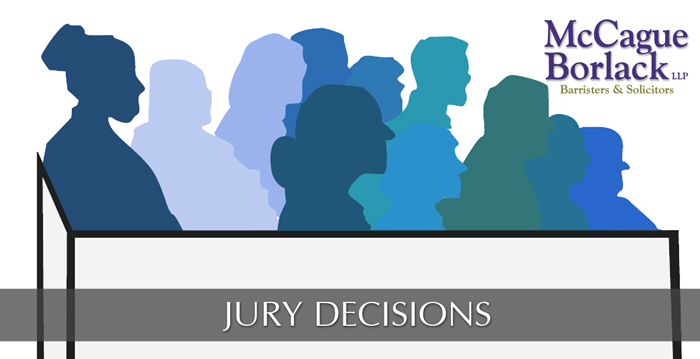
Jury Questions: When to Ask for ReasonsCase Study: Cheung v. Samra 2020 ONSC 4904 |
|||
|
September 2020 Introduction In Ontario, there is a well-established practice of asking jurors to provide reasons for their verdicts. This practice is grounded in section 108(5) of the Courts of Justice Act, R.S.O. 1990, c. 43, which gives trial judges, for jury cases, the discretion to require the jury to give a general verdict or answer specific questions, meaning jurors may be required to explain how or why they arrived at their general verdicts when answering specific questions. |
||
Despite section 108(5), the jury is not absolutely required to provide reasons for their verdicts, even in complex cases. It is deemed that juries understand and correctly apply the instructions provided to them by the trial judge.1 In other words, there is a presumption of integrity regarding general verdicts; simply because the jury did not explain its verdict is not a ground for appeal. The exception to this presumption arises in professional negligence cases. The Supreme Court of Canada directed that juries in professional negligence cases should be asked to give reasons explaining how the defendant was negligent.2 The purpose of this is to test the jury's understanding and correct application of the trial judge's instructions regarding negligence.3 As such, and to ensure jurors are fairly deciding the case before them, it has become standard practice to require juries to provide particulars of how they arrived at their decisions regarding the standard of care and causation.4 However, requiring juries to provide reasons for their decisions is not always necessary. In straightforward cases, there may not be a need to test the jury's understanding of the judge's instructions on negligence, and thus no need to require the jury to provide particulars.5 For example, in a motor vehicle accident case in which liability is fairly obvious, asking the jury to explain they are holding the defendant liable may not be needed in the interest of justice. In Poonwasee v Plaza, the court stated that the advantages of the jury being required to provide particulars are the ability to
Conversely, the court considered the disadvantages of requesting particulars to be that
It is possible that the jury will give reasons that reveal a problem with their understanding or application of the judge's instructions, or that the jury will given insufficient reasons that are not responsive to the questions put to them. This may open the door to an appeal that would not have been available had the jury not been asked to provide particulars. The recent Divisional Court decision of Cheung v. Samra (“Cheng”),6 in which the Divisional Court agreed with the trial judge that the action should be re-tried due to the jury's insufficient answers on causation, illustrates the potential consequences of requesting a jury to provide reasons. Factual Background Cheung involved a compromised birth in which the infant plaintiff suffered brain damage and became severely disabled. The baby suffered a medical emergency at the time of her birth but seemed to recover well. At around two and a half months, the baby suffered a seizure, and her condition declined. The issue to be decided was whether the brain damage occurred in or around the time of her birth, or whether it was unrelated to her birth. At trial, the judge instructed the jury to determine whether the defendant had breached the applicable standard of care and, if so, whether the breach caused the infant's brain damage. The jury was asked to give reasons for both findings. The ultimate verdict was that the defendant had breached the standard of care, with the jury explaining that the defendants should have delivered the baby sooner. With respect to causation, although there was medical evidence before the court to support the causal link between the defendant's behaviour and the brain damage, the jury's reasons did not refer to such evidence. Instead, the jury's answer simply indicated that the defendant's failure to deliver the baby sooner probably caused the brain damage, but did not explain why. After reviewing the verdict, the trial judge concluded that the jury's answer regarding causation demonstrated that they did not follow her instructions. The jury's reasons regarding causation were held to be insufficient, resulting in the trial judge refusing to grant judgment and instead directed the matter to be re-tried. Both parties appealed. The Appeal The appeal in Cheung dealt with the sufficiency of the jury's reasons as to how they arrived at their answers regarding causation. The court considered
The Divisional Court stated that there are times in civil cases when jurors are asked to provide the reasons behind their decisions, and times when they are not. If the court asked the jury to give reasons or particulars, then the jury must do so; it is not permitted to simply presume that the jury understood the instructions given to them by the trial judge.
Due to the presumption that jurors understand and correctly apply the instructions given by judges, the threshold of gauging the sufficiency of the jury's answers should be low. The court stated that such answers should be given the fullest possible effect, supported by any possible reasonable construction since jurors are laypeople without legal training. Reasons should only be deemed insufficient if:
Given the above, the Divisional Court held that trial judges may only reject a jury's decision if the verdict manifests a legal error. In instances where the jury is asked to provide reasons to support its decision, trial judges are justified in ordering a new trial if the reasons given by the jury are insufficient to the degree that they “undermine the integrity of the verdict” or “manifest confusion about the issues and instructions and leave the real issue in doubt.” Finally, the Divisional Court affirmed the trial judge's ruling that the jury's decision was insufficient, as the jury's reasons raised questions regarding their understanding and application of the trial judge's instructions. The problem lied in the fact that the reasons did not refer to how the baby's current condition was caused by brain damage sustained on or around the time of her birth. Instead, the jury simply stated that the failure to deliver the baby earlier more-likely-than-not caused her brain damage, but did not explain why. This left the issue of causation in doubt, warranting a new trial. Conclusion Whether or not to request particulars should be decided on a case-by-case basis, depending on the circumstances of the case. In addition to the advantages and disadvantages discussed in Poonwasee v Plaza, as seen in this case, asking the jury to provide particulars may result in an appeal that would not have been available otherwise. That said, certain cases, such as professional negligence cases, require the jury to be asked to provide reasons. As such, and as with most all cases, lawyers and their clients need to weigh both the law and strategy when making the decision as to whether to ask the jury to explain their decisions.
|
|||
TORONTO | OTTAWA | KITCHENER | BARRIE | LONDON McCague Borlack LLP is a member of the Canadian Litigation Counsel, a nationwide affiliation of independent law firms. Through CLC's association with The Harmonie Group, our clients have access to legal excellence throughout North America, the U.K. and Europe. |
|||
